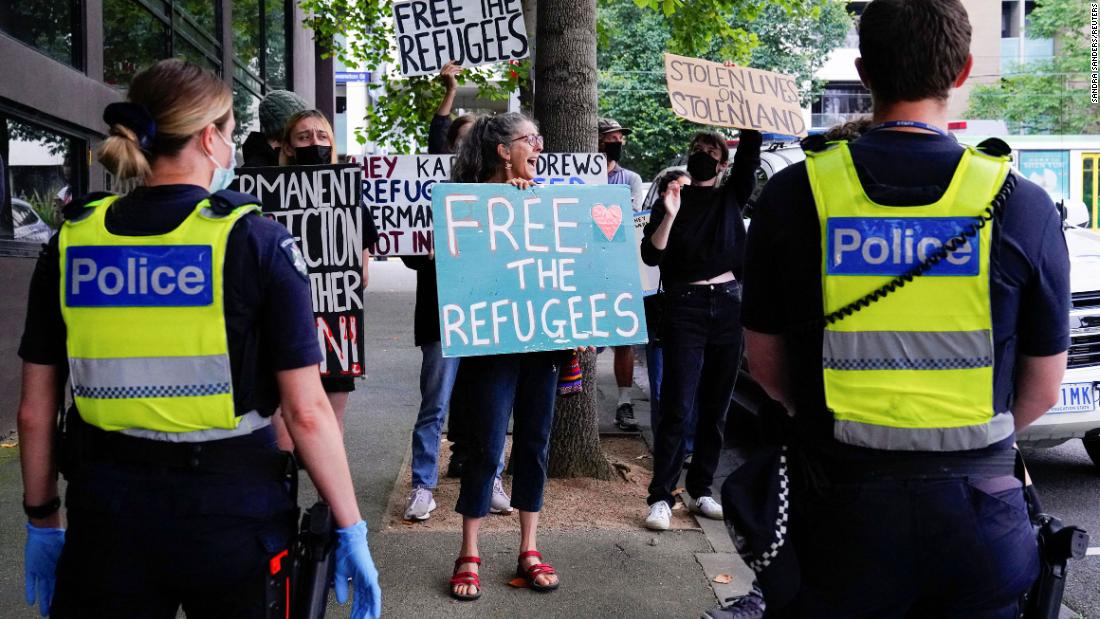Judge Anthony Kelly’s ruling that Novak Djokovic would be free to compete in the Australian Open quashed government insistence he should be banned for failing to prove he was free from being vaccinated against Covid -19.
The small group of Australian anti-vaxxers see Djokovic as a hero who faced the state – and won. Others, especially those from the Serbian community in Australia, see him as a victim of unjust persecution. On Monday evening, supporters took to the streets outside the office of the Serbian lawyer in Melbourne chanting, “Free Novak. Free Novak. Free Novak.”
On Monday, as lawyers for Djokovic argued that their client had done everything humanly possible to meet the government’s vaccination exemption requirements, Australia’s Covid-19 cases approached a total of 1 million pandemics.
At first glance, these numbers may suggest that the unvaccinated Djokovic does not pose a serious risk to the health of the Australian public, as the government has argued. It may also suggest that Australia’s strict anti-Covid measures have ended – and in many ways they have been.
However, for millions of Australians, memories of uncompromising border closures and other pandemic restrictions remain fresh.
Months before a federal election, it can be assumed that the ruling Liberal Party decided that allowing Djokovic into the country contradicted its message that vaccinations are the way out of the pandemic and that the pain of the past two years to keep Covid cases low was worth this.
But in losing the legal challenge, the government may have only succeeded in presenting one of the world’s most high-profile anti-vaccines as a victim and its officials as bullies using their executive power to argue a case. political point of view.
Severe border restrictions prevented Australians from entering
The Liberal Party, led by Prime Minister Scott Morrison, has long boasted of being tough on borders, and this was especially the case during the pandemic.
Australia was one of the first countries to adopt a zero Covid policy when international borders were closed in March 2020.
The move succeeded in keeping the number of Covid deaths in the country at an enviable level, but the move has had serious repercussions for Australians living outside the country – and those inside.
A ban was imposed on anyone leaving the country without a valid exemption, which was difficult to obtain, and all new arrivals were taken to government-run hotels for a two-week quarantine.
But the restrictions were not enough. Outbreaks have seen Melbourne and Sydney locked up for months, and finally, late last year, the government recognized that Covid-19 could not be contained.
The sudden rush for PCR testing has resulted in people lining up for hours to get a test that in some cases hasn’t been returned for days as testing clinics. has become outdated. Some people who feared infection tried to get rapid antigenic tests, but the faster personal tests are hard to find. Federal Health Minister Greg Hunt on Sunday promised millions of tests were underway, meanwhile many are following advice to stay home and watch for symptoms.
Vaccines are essential
The government has told Australians vaccinations are the way out of the pandemic. After a slow rollout, the country has one of the highest vaccination rates in the world – 92% of eligible people over 16 are fully vaccinated, according to government statistics.
But despite being ahead in the fight against Covid-19, Australia has only just started vaccinating children aged 5 to 11.
Queensland has already delayed the start of the school year by two weeks to avoid the expected spike in cases in that state in late January and early February. Other states have said school will start on time as usual, despite the number of cases.
There is no formal lockdown in Australia, but as cases increase some people are isolating themselves to avoid catching the virus. Shelves are empty in some supermarkets as supply chains are strained due to worker absences due to illness or isolation. Health workers say they are exhausted despite official assurances the system is facing.
At the start of the Djokovic saga, some speculated that the government’s focus on his visa was a distraction from the problems plaguing ordinary Australians. If so, it only succeeded in diverting attention to another normally overlooked issue: the country’s treatment of refugees.
They are bound by the same migration law that temporarily detained Djokovic. The same court that settled her case has heard their arguments for years. And the same minister who would consider re-arresting Djokovic has the power to release them.
At the very least, for many Australians, the past two years have provided some perspective.
Some are now wondering why special privileges are given to athletes who travel the world while others have recently struggled to cross a state border to see a loved one – and now struggle to take a test for even confirm their illness.
The questions become particularly pointed if a particular athletic person – by their words and actions – directly contradicts the promise that vaccinations will mean a return to normal life.
If and when Djokovic shows up in court with the aim of claiming a record 10th Australian Open title, chances are most of the cheers won’t be on him.
And when the government calls an election, he hopes most Australians ignore his latest blunder and forget the humiliating court order to release – and pay the costs – one of the world’s most successful sportsmen.

